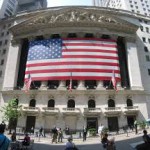
The fact that markets are flat after la crise JPMorgan Chase came to light — and that JPM stock is down only 7.3 percent as of this writing — shouldn’t be a comfort to anyone.
The takeaway isn’t that the financial and economic worlds are more robust than they were four years ago and better able to handle such shocks.
Nor does this massive and purportedly unexpected loss prove that the Obama financial regulations are working. Taking that angle, a few people are saying that the mess points up the need for Dodd-Frank’s Volcker rule, which would ban proprietary trading by banks.
(Under this line or reasoning, the problem with the Volcker Rule is only that regulators haven’t implemented it yet — banks may have until 2014 to comply — and that the rule may contain too many exceptions.)
What the calm markets prove is that people and companies have gotten used to the fact that the global financial system remains utterly broken. It’s priced in, as they say.
Nobody is shocked by a bank’s shocking breach of risk management because nobody expects anything different. Banks are still black boxes of murky risk. Investors who care about this problem left long ago.
As for financial regulations: nobody knows whether the Volcker Rule would have prevented this loss or not. The reason why it’s taking regulators so long to implement the rule is that it is impossible to determine what, exactly, proprietary trading is.
When a bank buys securities in the expectation that clients will want to buy them in a few weeks, is that proprietary trading? Is a bank hedging its portfolio in the expectation that markets will decline in the short-term an example of proprietary trading?
Talking about the Volcker Rule is a distraction from the real question: are the new rules governing derivatives working?
JPMorgan took this loss via huge derivatives trades, executed in London. This, when regulators at the Commodity Futures Trading Commission have pretty much finalized their rules on derivatives.
To avoid a repeat of AIG, financial firms are supposed to trade “standardized” derivatives over central clearinghouses. Exemptions abound for “custom” derivatives.
Observers should wonder:
- Were JPMorgan’s derivatives “standard” or “custom”? If custom, why?
- Did the new rules prevent JPMorgan from taking even bigger bets, or from trying to fudge losses with overly optimistic valuations? (If so, good!)
- Do the derivatives rules even apply to transaction that take place in London? If not, what’s London doing to limit the risks of derivatives?
If derivatives rules are working right, JPMorgan Chase could go bankrupt tonight, and the financial system and the economy would survive it.
Oddly enough, such an event would be a success: a sign that markets are working.
If the derivatives rules are not working, regulators can micromanage the Volcker Rule all they want. But they’d still have to bail out a failing bank to save the rest of the economy.
The trouble is, we don’t really know.



